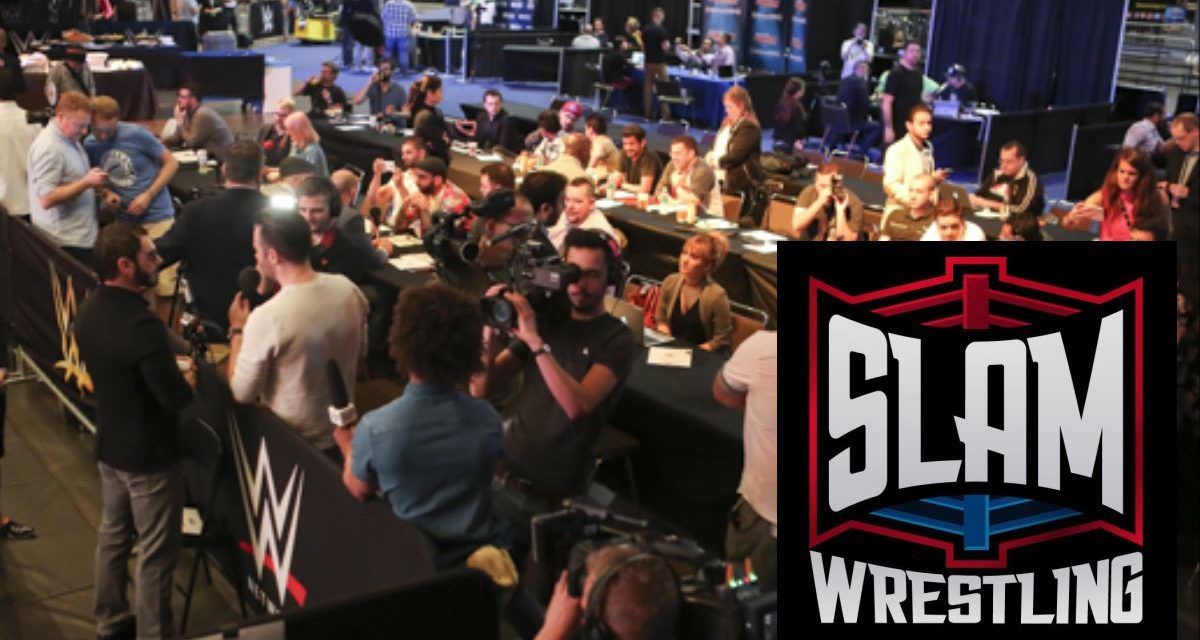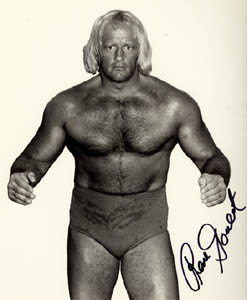
Rene Goulet
By GREG OLIVER & STEPHEN LAROCHE — SLAM! Wrestling
In this world of instant information, somehow, some way, the passing of former wrestling star Rene Goulet escaped the news until mid-December, nearly eight months after his death on May 25, 2019. He was 86.
Goulet, who was born Robert Bedard on July 12, 1932, in Quebec City to parents Ulric Bedard and Stella Arcand, died in Indian Trail, North Carolina. He was survived by his wife Pierrette, his daughter Johanne; his sister Suzanne, and his extended family.
The obituary requested donations to the Alzheimer’s Association, likely part of the reason that he had not been in the public eye for some time.
He was always friendly and forthcoming with stories for SLAM! Wrestling, and is well-represented by the books by the likes of Greg Oliver and Steve Johnson, and Pat Laprade and Bertrand Hebert.
To mark his career, here is an original story written by Stephen Laroche, that ran in April 2001 on SLAM! Wrestling, but is currently unavailable on the site due to technical issues. It’s a piece that stands the test of time:
Talking with the “master of the claw”
Rene Goulet: Consummate pro
If you asked ten different wrestling fans about Rene Goulet, you would probably get several different answers: a solid technical wrestler; a magnificent heel as Sgt. Jacques Goulet; one of the best-known jobbers from early ’80s WWF television programs; one of the guys who would run in to break up a fight on WWF TV; the “master of the claw”
Goulet, who was born Robert Bedard in Quebec City on July 12, 1932, could be considered one of the greatest jack-of-all-trades the industry has known. However, wrestling wasn’t originally his calling in the world of sports.
“I was always in sports,” Goulet told SLAM! Wrestling. “I played hockey back home in Quebec, amateur hockey. In those days when they only had five or six teams in the National Hockey League. Junior A was the next step to the majors, and I didn’t make it there. But, I went to training camp with a couple of teams when Jean Beliveau played for the Citadelles and with the Montreal Nationals when ‘Boom Boom’ Geoffrion was there.”
The young defenceman’s hockey career and life almost came to an end during a freak on-ice accident during a practice.
“I almost got killed playing hockey,” he said. “I was in practice before the season started and this guy was coming down — I was playing defenceman — I gave him a bodycheck. He went down, and in those days the skates were different, his skate hit me under the chin and the blade went through my throat. It almost killed me. I was in the hospital for six days, but after that I was on my feet. I made the season and went back to play after that.”
Despite an interest in becoming a boxer, Goulet prepared to make his debut as a professional wrestler at a card in his hometown.
“My first real match was in 1956 in Quebec City,” he said. “That night I was supposed to wrestle against Mad Dog Vachon. At that time he was still Maurice Vachon and not the Mad Dog yet — but he was worse than a mad dog. Lucky enough for me he didn’t show up that night. He was in Montreal and couldn’t make it to Quebec City and was replaced by a French Canadian named Gerald Dugas. I won, and man, it was tough. I was very, very nervous, especially in my home town. My wrestling career really didn’t start until 1963. In 1956-57 I only wrestled two or three times a year. We were local boys back home in Quebec and we couldn’t get any break whatsoever.
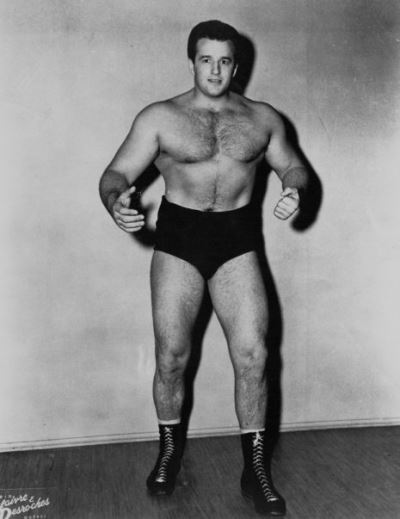
A young Bob Bedard.
Five years later, Goulet was given his first real opportunity in pro wrestling by the man who he was supposed to face in his debut.
“Finally, I wrestled the Mad Dog in ’61 or ’62 in Montreal at the Forum,” he said. “After the match, Maurice asked me “why don’t you go to the States and wrestle?” I said I didn’t know anybody and don’t speak a word of english. He said, “well, I’ll send you to Minneapolis.” He grabbed the phone and called Wally Karbo, who at the time was the promoter with (Verne) Gagne. I went up there and that was it. I’ve been on the road ever since.”
Gagne and his partner Wally Karbo gave the young French-Canadian his first opportunity with a large promotion, but they decided to make a small change before putting him in their ring. The name of Rene Goulet came about as a nod to singer Robert Goulet, who was popular at the time.
However, Goulet had other barriers to face in the ring. He was unable to speak English, which made the first few matches quite difficult.
“I couldn’t speak a word of English. That was very tough for me. You would get in the ring and the guys would tell you something and I couldn’t understand a damned thing. In those days I used to wrestle against Curt Hennig’s father, Larry “The Axe”. He was a big, tough kind of bully. He used to beat the hell out of me. That’s how I learned. I learned good too, good and fast!”
Hennig had nothing but praise for his old friend. “He was a great tag team wrestler,” Hennig said. “Always trained hard, worked hard.”
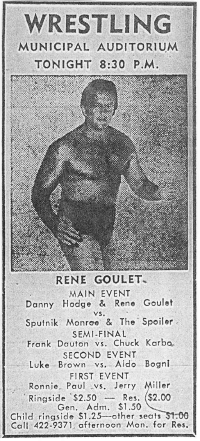
On a 1970 card in Shreveport. Louisiana.
After nearly a decade in the Minneapolis territory, Goulet would occasionally wrestle with other promotions during the summer when Gagne would run fewer shows. It was also around this time when he would participate in a rare babyface match with Jerry Brisco in Oklahoma City. The epic battle resulted in a draw, and the crowd demanded a rematch.
Goulet had many positive things to say about his time with the AWA.
“That was a good time, a good experience. I was very happy with it. I was in Minneapolis in and out for almost 10 years. I used to stay there for about a year or 15 months and go to a different territory and switch back again. Minneapolis at the time was considered the number one territory. If you were in there, that was pretty good. I was very happy because they gave me a break and I was working on top.”
A decision to relocate to Vince McMahon’s WWWF in 1971 resulted in Goulet’s first chance at championship gold. He was partnered with tough-as-nails Karl Gotch and they defeated “Crazy” Luke Graham and Tarzan Tyler for the tag team title on December 6, 1971.
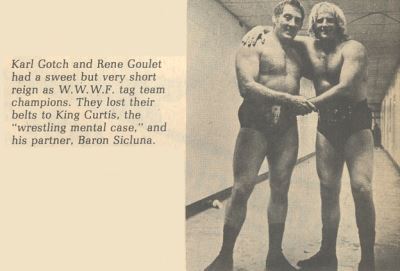
A wrestling magazine noting the brief WWWF tag team championship run of Karl Gotch and Rene Goulet.
“The first time I went (to wrestle) for Vince Sr. was in 1971,” he said. “They put me with Karl Gotch — he was a tough son-of-a-gun, a shooter — and we got the belts from Tarzan Tyler and Luke Graham. Just after we had the belts, everything was going good, Gotch had a chance to got to [Antonio] Inoki’s new promotion in Japan. They came all the way to New York and asked Karl if he wanted to become their booker. He agreed with it, and here I am by myself. We were supposed to keep the belts for a year.”
Kotch and Goulet dropped the belts to Baron Mikel Scicluna and King Curtis at the next television taping (February 1, 1972), and he stayed on a few more months before looking for new opportunities.
“I placed a call to Verne Gagne to go back there,” he said. “He asked me if I wanted to go to Japan, and I said okay. Before I went to Japan, I booked myself in Montreal for Maurice Vachon and his partner who had just started Grand Prix wrestling.”
Originally, Goulet was to leave for Japan with Tarzan Tyler, Baron Scicluna and Big Bill Miller. However, Tyler was injured during a match with Andre the Giant. He enjoyed working in Japan and recalled one particular incident which was particularly humourous.
“I got into an incident there,” he said. “We had a six-man tag against three Japanese guys. One guy we didn’t like too much, his name was Tanaka, and I was in the ring with him and he was beating the hell out of me. I’m down on my knees and I grabbed his wrestling tights and pulled them all the way down to his ankles. He was bare-assed naked! He was so insulted — this guy was pissed. I went and tagged Bill Miller and the Japanese people were laughing. After the tour he said I really insulted him.”
Goulet also worked briefly in Germany in the early ’70s. The promoters decided to call him Buddy Rogers, Jr. He was amazed by the use of lighting and entrance music before match, something which was being done 10 years before North American promotions.
He also toured Australia, Hawaii and wrestled for a number of different promotions during the ’70s. Goulet believes this made him a better performer in the ring.
“In those days, that was what made you such a good worker compared to those guys today. When you worked in a new territory, everything was changed. Most of the time, you would have a different opponent every night, you didn’t wrestle the same guys, the same bullsh*t. That’s how you learned the business and became a hell of a worker. No offense to some of the guys today, but that’s what it was.”
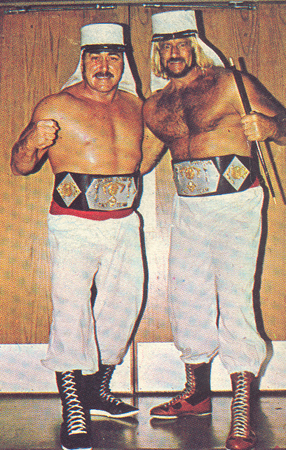
The Legionnaires, Don Fargo and Goulet in 1975. Said Goulet to Greg Oliver one time on Fargo: “”All the stories you hear about him, it’s hard to believe, but they’re all true.” (For more on Fargo, see his autobiography “The Hard Way”)
Upon returning to North America, Goulet made a decision which would alter the course of his career.
“I said I didn’t want to work babyface anymore,” said Goulet. “I felt much better in that position.”
It was also around this time when he would meet one of his greatest friends in the industry — Andre The Giant.
“I travelled with Andre The Giant and was very close friends with him,” he said. “He used to live 60 miles out of Charlotte. This guy was amazing. He was a true giant in this business and he was very good. He was a ring leader.”
Goulet had a great deal of respect for the Eighth Wonder of the World, and still thinks of him today.
“If Andre called something, you’d better do it,” said Goulet. “He was not an ego guy. He would think about the whole match, and wherever he goes, he was the man. He was a good friend of mine, and I really miss the guy.”
Goulet became a feared opponent all over North America because he used the claw hold as a finisher. The idea to use it was proposed to him by Dusty Rhodes during a stint in Florida. He feels that it wasn’t anything which was revolutionary.
“Nothing is new in the wrestling business,” he said. “The claw was used by different people like Fritz Von Erich in Dallas, Don Jardine and Baron Von Raschke. I started using it in Minneapolis. When I became Sgt. Jacques Goulet, I would put the claw on the guys and beat them like that.”
Goulet has made many friends in professional wrestling, including a young Ric Flair, whom he handed his first defeat. Flair recently spoke with SLAM! Wrestling and gave overwhelming praise to Goulet.
“He was one of the greatest people I’ve known in the industry,” he said. “He was a consummate professional and a good personal friend as well.”
When asked for a particular memory of Goulet, Flair was in rare form. “I can’t tell you because his wife will read the article,” Flair joked. “He’s a great guy. He and his wife are real nice people.”
Even former WWF champion Bruno Sammartino, who was not a close friend of Goulet’s, understood how much he contributed to wrestling. “I only wrestled him a couple of times,” Sammartino said. “He was a terrific performer in the ring. He was a guy who loved the business.”
As the ’70s drew to a close, Goulet headed back to the WWWF in search of a greater opportunity.
“I came back to again in 1979 working for Vince McMahon,” he said. “That’s when I started making really good money.”
“We started January 1 — Hogan, myself, the Samoans and Ken Patera. We had a hell of a crew. Business was good. Every place we’d go was packed.”
Some of Goulet’s earliest matches in his WWF return were against a young Hulk Hogan. Once again, Goulet was to battle with one of the wrestling’s biggest stars during the infancy of their career.
“Hogan was a heel at the time,” he recalled. “I wrestled to put him over, and that was good for me because I made more money that way. That helped him learn more of the business.”
However, this stay in the New York territory was short-lived and Goulet returned to the AWA.
“I stayed in New York for a year and went to Minneapolis,” he said. “Hogan was there again with Verne. Then he was the babyface and I was the heel. I worked with him all over the territory to put him over again. Hogan was over like a million dollars. Minneapolis was the hottest territory in the country, especially when Hogan was there. It was unbelievable.”
After his final AWA stint, Goulet made a choice which would shape the rest of his career by returning to New York prior to Vince McMahon, Jr. purchasing the company from his father. Not only was he wrestling nearly 300 nights a year, but he also had some new responsibilities.
“At first I became a (road) agent while I was still wrestling,” said Goulet. “I used to wrestle the first match, then I would tell the guys what to do and take care of the dressing room. Sometimes I used to go to the box office with my wrestling boots on.”
Goulet would wrestle his last match in Detroit in 1984 and became a full-time road agent. He also had a feature on the Tuesday Night Titans program called Cafe Rene. The wrestling business was beginning to reach new heights, even bigger than today, in Goulet’s opinion. “They talk about how today the business is good,” he said. “But in those days I’d say it was even better. We used to run three towns a night in those days and it was sold out. It was unbelievable. That was a hell of an era.”
Goulet would make one last in-ring appearance as a wrestler in 1987 during an oldtimer’s battle royal at New Jersey’s Brendan Byrne Arena.
For the rest of his tenure with the WWF, Goulet would look after backstage matters and make sporadic appearances on television programming whenever individuals from the backstage area were brought out to break up a heated post-match battle.
A long career in wrestling came to an abrupt end in 1997 when he was notified his services were no longer needed.
“One night Jerry Brisco called me and told me I was still with the World Wrestling Federation, but they would use me if the need to,” he said. “But hey, no hard feelings. You don’t have and sympathy in the wrestling business. I had some good times and some tough times. An agent was a tough job. You had to please the boys and please the office. You were in the middle at all times.”
Goulet doesn’t appear to be bitter about how his career ended.
“When you finish in the wrestling business, they sometimes forget you. It’s a no mercy business, guys drop dead and they step over you. The wrestling career was good for me,” he said. “No regrets, and I would do it again. It was a good time. Sometimes it’s hard on your family because you’re always gone. I wish I could have kept it going for another couple of years.”
Today, Goulet is retired and resides in Charlotte, North Carolina, where has lived for over 20 years. Several weeks ago, he underwent hip replacement surgery and notes he is recovering nicely.
“It’s the first time in my life I’ve done nothing for six weeks,” he said.
After becoming an American citizen three years ago, he spends a great deal of time playing in golf and expects to be back on the links in about six months. He doesn’t watch wrestling very much these days, but offered his thoughts on current WWF product.
“What I don’t like about it today is it’s the same thing over and over. They’ve got the same format, and I hope they change it pretty damned fast. It’s a 25-30 minute start to the show and it’s getting boring as hell.”
He also offered praise for the WWF’s talent, especially Kurt Angle.
“The WWF has fantastic matches on their show, they’ve got great talent,” he said. “One guy I like is that kid Kurt Angle. In the time I’ve been in the wrestling business, most of the time you bring a guy in from amateurs into pros it’s not good. For this guy in the short amount of time he’s been in the pros — unbelievable! He’s learned a bit, he’s a good talker, he’s good in the ring. He’s unbelievable.”
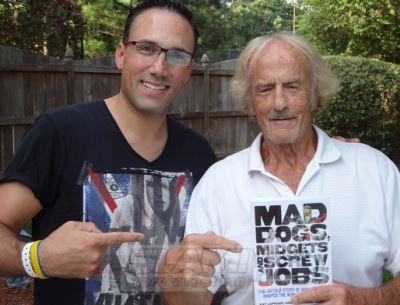
Author Pat Laprade presents Rene Goulet with a copy of his book, Mad Dogs, Midgets and Screw Jobs.
